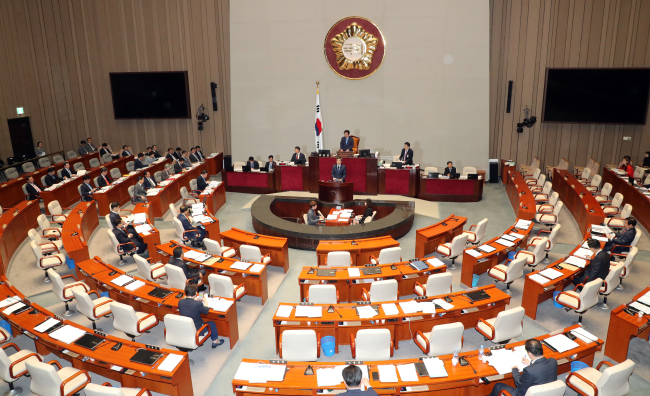The floor leaders of rival parties met Wednesday to discuss how to form parliamentary standing committees in an effort to normalize an idle National Assembly.
They launched negotiations over the details of the 18 standing committees that will operate in the second half of the 20th parliament's four-year term.
The National Assembly has been inactive for about a month mainly because opposition parties have been grappling with their crushing defeat in the June 13 local elections.
Former Speaker Chung Sye-kyun's two-year term ended in late May, but parties have failed to pick his successor and to narrow the gap over the committee formation as they focused on campaigning for the elections.
Stung by the humiliating election defeat, the main opposition Liberty Korea Party and other minor opposition parties were busy handling the post-election situation.
The conservative LKP was embroiled in an internal strife over who should be responsible for the defeat. The minor opposition Bareunmirae Party selected a new floor leader Monday after its two co-chiefs and other senior officials stepped down.
They launched negotiations over the details of the 18 standing committees that will operate in the second half of the 20th parliament's four-year term.
The National Assembly has been inactive for about a month mainly because opposition parties have been grappling with their crushing defeat in the June 13 local elections.
Former Speaker Chung Sye-kyun's two-year term ended in late May, but parties have failed to pick his successor and to narrow the gap over the committee formation as they focused on campaigning for the elections.
Stung by the humiliating election defeat, the main opposition Liberty Korea Party and other minor opposition parties were busy handling the post-election situation.
The conservative LKP was embroiled in an internal strife over who should be responsible for the defeat. The minor opposition Bareunmirae Party selected a new floor leader Monday after its two co-chiefs and other senior officials stepped down.

But apparently mindful of public backlash, the opposition parties agreed to start the discussions on the committee formation.
Wednesday's meeting brought together Hong Young-pyo of the ruling Democratic Party, Kim Sung-tae of the LKP, Kim Kwan-young of the minor opposition BP and Chang Byoung-wan, the representative of a joint floor negotiation bloc of two minor parties.
"We will make efforts to complete the committee formation as soon as possible. It won't take much time if we follow the principles set by the National Assembly and practices," Hong of the DP said at the start of the meeting.
"The DP will do its best to elicit compromise by making concessions at its disposal," he added.
Kim of the LKP called for the DP's "big" concessions to prevent the ruling party from heavily controlling the legislative branch.
Earlier in the day, Kim Kwan-young of the BP told a radio program that the parties should conclude the consultations this week to enable a plenary session to be held Friday for approval.
Tough negotiations are expected over the election of the parliamentary chairmanship and the distribution of standing committees.
The governing DP said that the parliamentary leadership, including a new speaker, should be first decided. But opposition parties claimed that the election of the parliamentary chairmanship should be handled in tandem with an allocation of standing committees.
The DP, which commands 130 seats in the 300-member parliament, elected Moon Hee-sang, a six-term lawmaker, in mid-May as its candidate for parliamentary speaker.
Customarily, a party with the most seats takes the parliamentary speakership, but the minor liberal opposition Party for Democracy and Peace calls for a free vote.
The DP also wants to be in charge of the House Steering Committee, in line with the tradition of allowing the ruling party's floor leader to take the post. It is a key committee that handles parliament's overall operations and also oversees the presidential office.
Currently, the LKP takes the post of the chief of the steering committee as the Saenuri Party, the LKP's predecessor, was the ruling party back in 2016, when the committee formation was decided.
What draws attention is also who will lead the Legislation and Judiciary Committee, a key panel on the passage of bills, and the Special Committee on Budget and Accounts, which reviews the government's budget proposal.
In South Korea's unicameral parliament, the judiciary committee is playing the role of the Upper House or Senate as it reviews bills before they are sent to a plenary session for approval.
A pile of bills on policy issues are pending. A confirmation hearing for the police chief nominee is also slated for early July.
The DP also plans to seek cooperation from opposition parties to buttress a joint declaration adopted after the inter-Korean summit in April through parliamentary ratification or a supportive resolution.
In May, the National Assembly failed to adopt the resolution as rival parties differed on the wording regarding North Korea's denuclearization. (Yonhap)




![[Herald Interview] 'Amid aging population, Korea to invite more young professionals from overseas'](http://res.heraldm.com/phpwas/restmb_idxmake.php?idx=644&simg=/content/image/2024/04/24/20240424050844_0.jpg&u=20240424200058)













![[KH Explains] Korean shipbuilding stocks rally: Real growth or bubble?](http://res.heraldm.com/phpwas/restmb_idxmake.php?idx=652&simg=/content/image/2024/04/25/20240425050656_0.jpg&u=)

